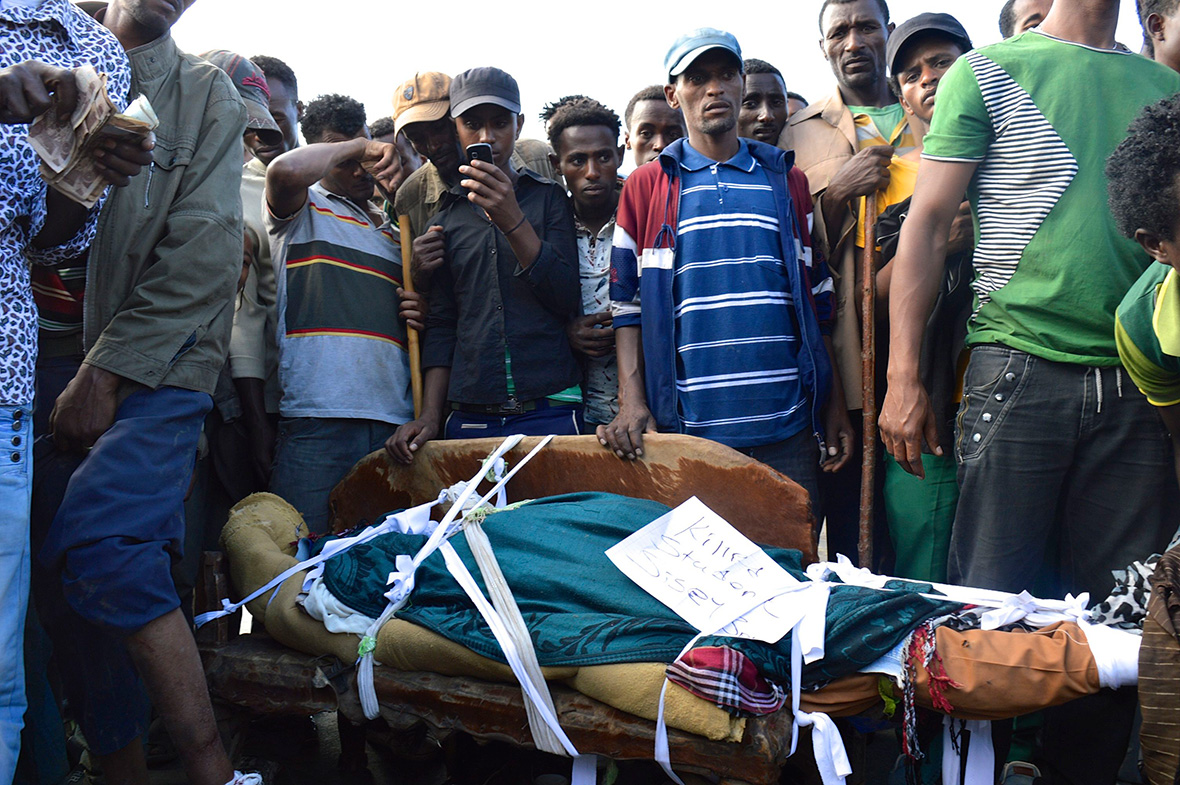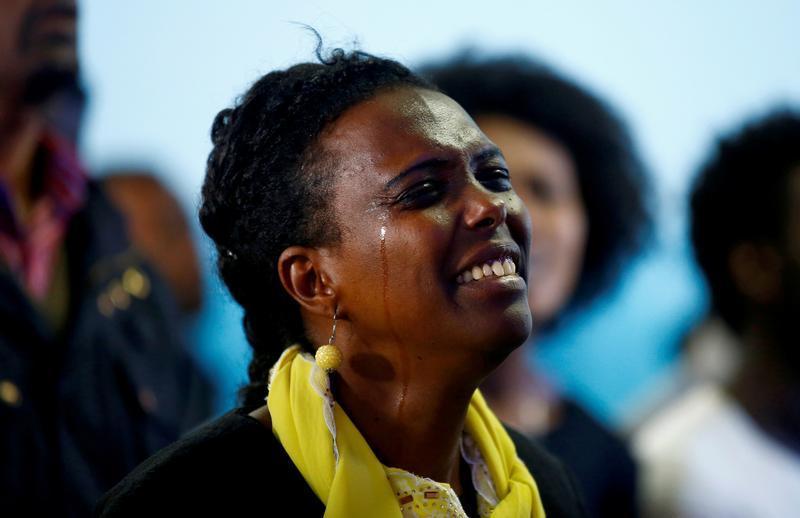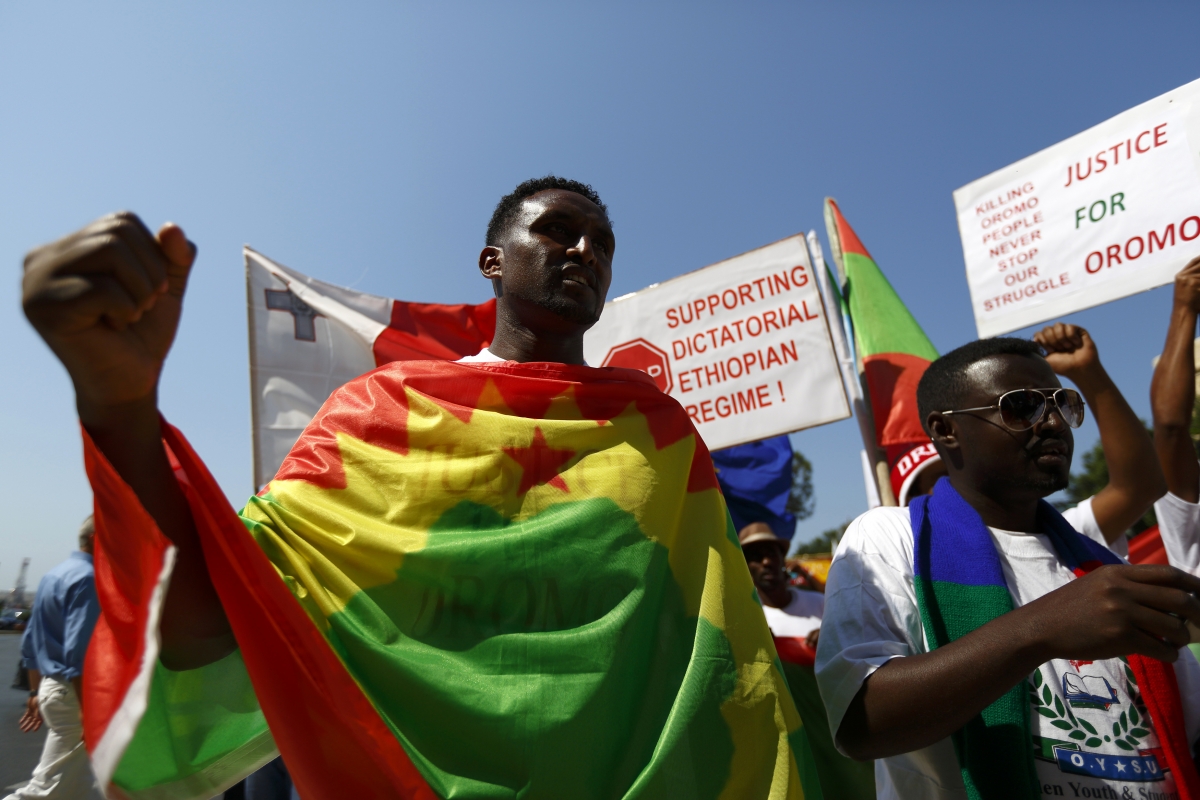Monday, October 31, 2016
#OromoProtests
Ethiopia: State of Emergency Risks New Abuses
Directive Codifies Vague, Overbroad Restrictions
(Nairobi) – An Ethiopian government directive under a state of emergency contains overly broad and vague provisions that risk triggering a human rights crisis, Human Rights Watch said today in a legal analysis. The government should promptly repeal or revise all elements of the directive that are contrary to international law.
A woman cries as she attends a prayer session at Biftu Bole Lutheran Church during a prayer and candle ceremony for those who died in the town of Bishoftu during Ireecha, the thanksgiving festival for the Oromo people, Addis Ababa, Ethiopia, October 9, 2016.
© REUTERS/Tiksa Negeri
On October 9, 2016, the government announced a six-month state of emergencyfollowing the destruction of some government buildings and private property by demonstrators. Over the past year, security forces have killed hundreds of protesters and detained tens of thousands in two regions where there have been numerous protests over government policies.
“Ethiopia’s state of emergency bans nearly all speech that the government disagrees with anywhere in the country for at least six months,” said Felix Horne, senior Africa researcher at Human Rights Watch. “The state of emergency hands the army new sweeping powers to crack down on demonstrators, further limiting the space for peaceful dissent.”
Related Content
Under the new state of emergency, the army can be deployed country-wide for at least six months. The implementing directive prescribes draconian restrictions on freedom of expression, association, and assembly that go far beyond what is permissible under international law and signal an increased militarized response to the situation. The directive effectively codifies many of the security forces’ abusive tactics that Human Rights Watch has documented since the protests began.
The directive includes far-reaching restrictions on sharing information on social media, watching diaspora television stations, and closing businesses as a gesture of protest, as well as curtailing opposition parties’ ability to communicate with the media. It specifically bans writing or sharing material via any platform that “could create misunderstanding between people or unrest.”
It bans all protests without government permission and permits arrest without court order in “a place assigned by the command post until the end of the state of emergency.” It also permits “rehabilitation” – a euphemism for short-term detention often involving physical punishment. Many of these restrictions are country-wide and not limited to the two of Ethiopia’s nine regions where most of the unrest took place.
Under international law, during a state of emergency a government may only suspend certain rights to the extent permitted by the “exigencies of the situation.” Many of the measures, including the restrictions on freedom of expression, assembly, and association go far beyond what is permitted under international law.
The government reports that since the state of emergency began, 1,600 people have been arrested, including about 50 for closing their businesses. Human Rights Watch also has received unconfirmed reports of unlawful killings, mass arrests, and looting of houses and businesses by the security forces. There have been some armed clashes between security forces and unidentified groups. Mobile phone access to the internet has been blocked since October 5. Addis Standard, a monthly English language magazine and one of the few independent publications left in Ethiopia, announced on October 25 that it was halting publication of its print edition due to state-of-emergency restrictions.
Large-scale, and mainly peaceful anti-government protests have been sweeping through Oromia, Ethiopia’s largest region, since November 2015, and the Amhara region since July 2016. Ethiopian security forces have killed more than 500 people during protests over the last year. These protests occurred in a context of the near-total closure of political space.
Protesters have voiced a variety of concerns, including issues related to development, the lack of political space, the brutality of the security forces, and domination of economic and political affairs by people affiliated with the ruling party. The emergency measures send a strong and chilling message that rather than dealing with expressed grievances and ensuring accountability for violence by both government forces and protesters, the government will continue and probably escalate the militarized response.
On October 2, in Bishoftu, a town 40 kilometers southeast of the capital, Addis Ababa, tensions ignited at the annual Irreecha festival – an important Oromo cultural event that draws millions of people each year. Security forces confronted huge crowds with tear gas and fired shots and scores of people then died during a stampede. Since then, alleged demonstrators have damaged a number of government buildings and private businesses perceived to be close to the ruling party, setting some on fire.
The government has in part blamed human rights groups seeking to document violations of international law for the recent unrest. Human Rights Watch has repeatedly called for an independent and credible investigation into the security force response to the protests and to the deaths in Bishoftu.
“Many of the abuses committed by security forces since November 2015 have now been codified under the state of emergency,” Horne said. “Trying to use the legal cover of a state of emergency as a pretext for the widespread suspension of rights not only violates the government’s international legal obligations, but will exacerbate tensions and long-term grievances, and risks plunging Ethiopia into a greater crisis.”
#OromoProtests
UN urges Ethiopia to end violence against peaceful protesters
Friday 14 October 2016 at 10:44 AM ETby Justin Cosgrove
[JURIST] The UN Office of the High Commissioner(OHCHR) [official website] on Wednesday urged[press release] Ethiopian authorities to end the violence against peaceful protesters. These attacks by Ethiopian authorities have reportedly led to over 600 deaths in the past year. In response to this violence, the UN has called for an international commission and have requested that the Ethiopian government allow for them to investigate the protests and the violent tactics used against the peaceful demonstrators. Experts claim that there have been numerous allegations of mass killings and disappearances, thousands of protesters injured and tens of thousands arrested. There is also concern that many of those arrested have faced torture and ill-treatment in military detention centers. Another main concern is the use of national security and counter-terrorism legislation to target individuals who are exercising their rights to peaceful assembly. Protests began a year ago [UN News Centre report] in response to the Government's plan to expand certain boundaries displacing farmers, along with the annexation of Konso Wereda into the Segen Arae Peoples Zone.
The conflict between the Ethiopian government and protestors has been widespread. Tensions increased over the past week when at least 55 were killed in clashes between police and protesters at a festival. Last month Ethiopia's opposition leader and leader of the Oromo ethnic group, Tiruneh Gamta, demanded the release of all political prisoners [JURIST report] "regardless of any political stand or religion or creed." The Oromo ethnic group, representing the largest group among the protesters, is largely credited with starting the protests last November when the government announced its plan to expand the capital into the Oromia region. Although the Oromos initially started protesting against what they viewed as a plan to remove them from fertile land in the region, the protests started taking on a different theme even as the government dropped its plan to expand the capital—one calling for the release of political prisoners [Al Jazeera report]. According to rights groups, at least 500 people have been killed and thousands arrested since the unrest began. In January several Ethiopian rights groups called on the international community to address the killing [JURIST report] of protesters.
Posted in Paper Chase
Sunday, October 30, 2016
#OromoProtests
Ethiopia's Regime Faces Precarious Times As Diaspora Plans for the Future
Posted 29 October 2016 16:19 GMT
In November 2015, residents of a small town called Ginchi launched protests against a proposal by Ethiopia’s government to expand Addis Ababa, the capital, into the surrounding farmlands in the Oromia region. The protests have since grown into a movement demanding greater self-rule, freedom and respect for the ethnic identity of the Oromo people, who have experienced systematic marginalization and persecution over the last quarter-century.
In Amhara, the country's second largest region, protests started in Gonder on July 31 this year, and rapidly devolved from addressing localized identity questions of the Welkait community into a region-wide movement that has spread into numerous other provinces in just four months. Though the large-scale July 31 incident in Gonder marked the first major confrontation between Amhara protest leaders and the Ethiopian government, the dispute between the Amharas and the regime can be traced back as far as the early 1990s, when the Tigrayan-dominated regime redrew the district boundaries of the Welkait community that belonged to ethnic Amharas into Tigray region. Some Amhara activists have described the ongoing Amhara protest as ‘25 years of anger unleashed’. The protesters in Gonder have also expressed slogans of solidarity for the protests in Oromia.
Although the protests in Oromia and Amhara started for different reasons, they both stem from Ethiopia's complex identity politics. In both regions, demonstrators are challenging the dominance of elites from one group — the Tigray — in Ethiopian politics. The Tigray make up 6% of the population but dominate the ranks of the military and government, while the Oromo are at 34% and the Amhara represent 27% of the country's population.
Since November, hundreds of protesters have been killed and thousands arrested. Early this month, at least 52 people were killed at a gathering for the Irreecha holiday in Oromia, after security forces triggered a stampede with smoke bombs and live bullets.
The protests’ amazing spread from Amhara to Oromia seemed to represent an important turning point in the year-old movement challenging the 25-year rule of the Ethiopian People's Revolutionary Democratic Front (EPRDF), the ruling political coalition, which is dominated by Tigrayan ethnic minority elites.
For observers and critics alike, these protests represent a watershed moment in modern Ethiopian political history. In mid-October, the government even declared a six-month state of emergency for the first time in 25 years.
State officials have continued to promise reforms, reaching out to what observers call “friendly opposition figures” like Lidetu Ayalew. Last week, however, there were mass arrests, and the authorities cut off digital communications. State propaganda and mandatory large-scale “training programs” for civil servants seem to signal that the government is struggling to contain the widespread anger and discontent.
Meanwhile, a significant number of the 251,000 members of the Ethiopian diasporacommunity who live in the United States are marking this historical moment by honoring the victims of the violence and holding vigils. More importantly, they have started to contemplate life without the incumbent regime.
As the protests gradually eat away at Ethiopia’s basic political and economic structures, the regime appears more wobbly that ever before. Consequently, the Ethiopian diaspora has convened conferences to discuss regime change, constitutional reforms, and others transitional issues. The conferences are organized by a number of diasporic political groups and individuals who are nevertheless divided along various ethno-national and ideological lines.
Of the events happening now in the Ethiopian diaspora, two prominent conferences stand out.
Oromo Conference for National Consensus, London, UK
The Oromo Conference for National Consensus was a pre-convention gathering at which political groups of the Oromos, the single largest Ethiopian ethnic group, deliberated about the Oromo Leadership Convention scheduled to take place this November in Atlanta, Georgia.
The pre-convention began in London on October 22, 2016, and concluded the following day. While the conference was underway, a division quickly emerged between the Oromo elites in the diaspora regarding the inclusiveness and the framing of the convention planned for Atlanta. The organizers of the Atlanta convention appeared to support the convention's proceeding as planned, despite remarks by prominent Oromo activists, journalists, and academics, who raised challenging questions and proposed various and complex alternative themes and frames for the convention.
The pre-convention reached a dramatic climax, however, when Liben Wako (a representative of an Oromo political group) caused a firestorm by saying, “The struggle of the Oromos is not to democratize Ethiopia but to rip it into pieces.”
Funny how the diaspora make up and break up Ethiopia while we the locals eat our breakfast, have a coffee with our neighbors and go to work.
The statement was a remarkable crystallization of the country's existential crisis, demonstrating that ethnic nationalism remains a potent and unresolved issue in Ethiopia today. In the current heightened ethno-national political climate, these kinds of statements threaten to exacerbate attitudes against non-Oromo Ethiopians who have supported the ongoing protest with the aim of democratizing Ethiopia.
Political movements in #Ethiopia can be supported by the diaspora, but should not be dictated by it. The People know what is best for them.
Roadmap for Transition and Constitution Making in Ethiopia
This conference took place on October 22 and 23, 2016, bringing together various individuals and political groups in Washington, D.C. The October event marked the the second time the event was held this year, with the first gathering in April 2016.
Scholars and political groups based in the diaspora presented papers, concept notes, and ideas about the ongoing protests and their repercussions in Ethiopia. Reportedly, most conference participants reached a consensus on an overarching Ethiopian civic national identity, while recognizing various ethnic identities. Most of the papers presented at the conference reflected this agreement.
Broadly speaking, two opposing political groups — ethno-nationalists and civic nationalists — have dominated the rhetoric that's shaped the two conferences. This dichotomy sometimes breaks down into conflicts between secessionists and unionists.
Written byEndalk
Thursday, October 27, 2016
#OromoProtests
Ethiopia state of emergency 'could further inflame issues' at the heart of Oromo protests
Analyst tells IBTimes UK grievances in Oromia 'an old problem' state of emergency might not be able to solve.
Earlier this month, Ethiopia declared a nationwide state of emergency following anti-government protests in the Oromia and Amhara regions. Members of the opposition, activists and rights groups repeatedly claimed the response to the protests, labelled as the biggest anti-government unrest Ethiopia has witnessed in recent history, have resulted in the death of more than 500 people since November 2015.
Critics of the state of emergency – which restricts, among other things, freedom of movement and the use of social media – claimed it will be used to quell the ongoing unrest.
The government, which often blamed "outside forces" including from Eritrea and Egypt for the protests, said it will use the new measures to co-ordinate security forces against "anti-peace elements" that aim to destabilise the country.
Earlier in October, Prime Minister Hailemariam Desalegn admitted the death toll could be higher than 500, but denied security forces had reacted disproportionately.
Protests in Amhara and Oromia 'different'
Protests in Amhara and Oromia were not driven by the same causes. In Amhara, people demonstrated calling for their lands to be administered by the Amhara region, instead of the Tigray state.
"Protests in Amhara are not by historically repressed groups, but by groups that historically created the Ethiopian empire and have done very well under this regime, certainly in economic terms," Harry Verhoeven, professor of government at Georgetown University, told IBTimes UK.
Oromo people – Ethiopia's largest ethnic group – have often claimed they are disenfranchised and discriminated against by the government. The latest spat of protests was sparked in November 2015 by a government draft "Addis Ababa master plan", which aimed to expand the boundaries of the capital.
Protesters argued the plan would lead to the forced evictions of Oromo farmers and would undermine the survival of the Oromo culture and language. The Ethiopian government scrapped the plan, following increasing agitation.
However, protests continued, with people calling for self-rule, the liberation of political prisoners and the end of what they perceive to be a military regime in the region.
"What is happening in Amhara is about who is in charge in the state. What is happening in Oromia is about a fairer share. Grievances are different," continued Verhoeven, whose research work focuses, among others, on the Horn of Africa.

An 'old Ethiopian problem'
Verhoeven explained the Oromo people have never done so well as they have under the current government, led by Oromo President Mulatu Teshome.
"However, many Oromo still feel that, despite this progress, other groups, in relative terms, have made faster progress. The government is trying to say that this is an entirely external problem, but this is an old Ethiopian problem, not something that was created by Eritrea or Egypt," he said.
"However, this is not to deny that what is happening in the country is being instrumentalised by outside forces, including the diaspora and some members of the Oromo Peoples' Democratic Organization (OPDO) party, who have been trying to use these protests to gain their concessions."
Verhoeven added that the state of emergency might fail to address long-standing issues at the heart of the protests in Oromia.
"Core issues are likely to further inflame. I know many Oromo who disagree with what is happening and actually like the regime, but who are quite furious because of what just happened," he said.
"Now that their ordinary lives are disrupted – in terms of movement, social contacts, in terms of internet access with the outside world – being opposed to the government is a lot more reasonable and attractive. And that's another manifestation of the party being blinded by its own history and its own culture and not seeing things for what they are."
In a statement sent to IBTimes UK, the Ethiopian embassy in London reiterated the six-month-long state emergency aims to restore peace and order in the country.
"There has been over six months of unrest that has threatened the nation's stability. In addition to this, there have been attacks on the people of the country, against vital infrastructure, businesses, health and education centres, as well as government offices and courts, many of which have been destroyed," read the statement.
"There have been attacks on businesses, many of them foreign-owned, including farms growing flowers for export. The EPRDF [ruling political coalition Ethiopian People's Revolutionary Democratic Front] - led democratic and developmental state is self-correcting and committed to resolving grievances and demands raised by people.
"It is intent on improving people's livelihoods by eradicating poverty and backwardness. Above all, the government is inward-looking and ready to learn from successes and weaknesses. The situation is now back to normal. The government is in discussion with a range of groups across the population, including opposition parties."

Subscribe to:
Comments (Atom)





